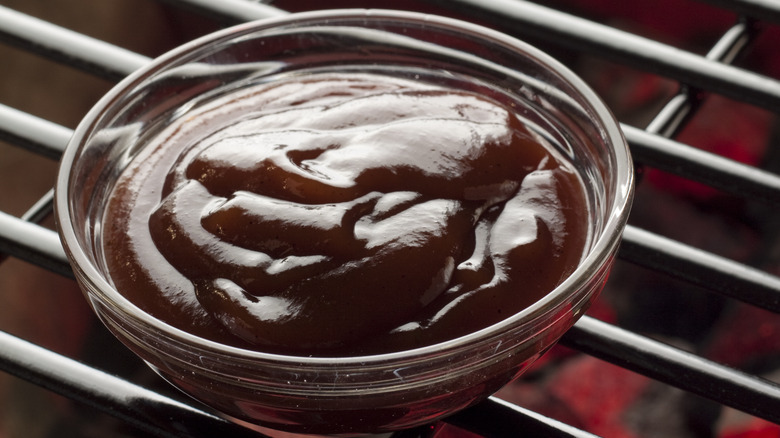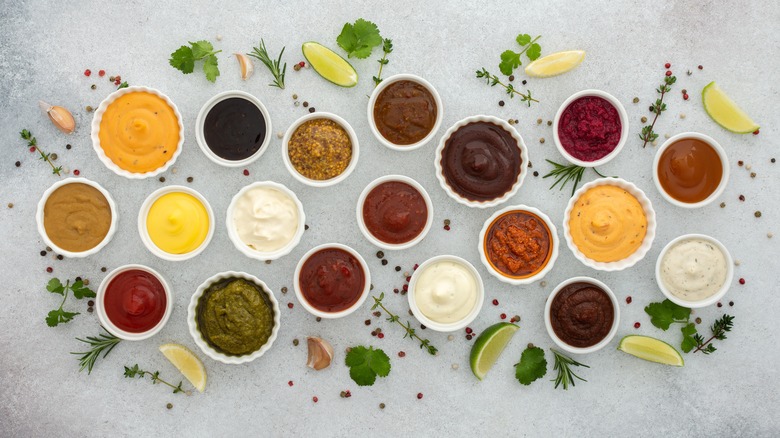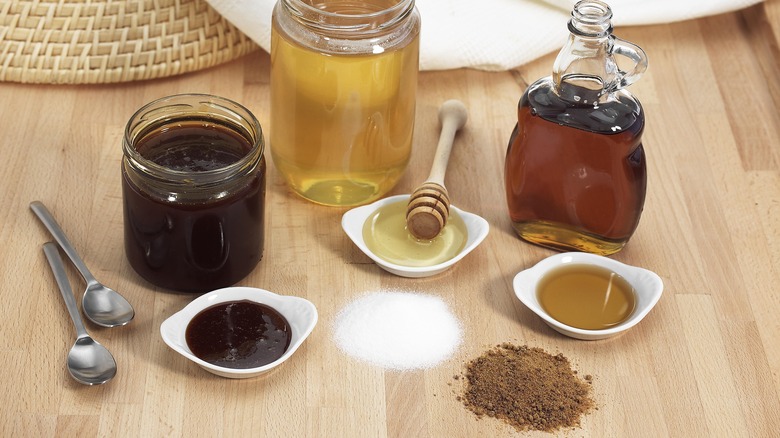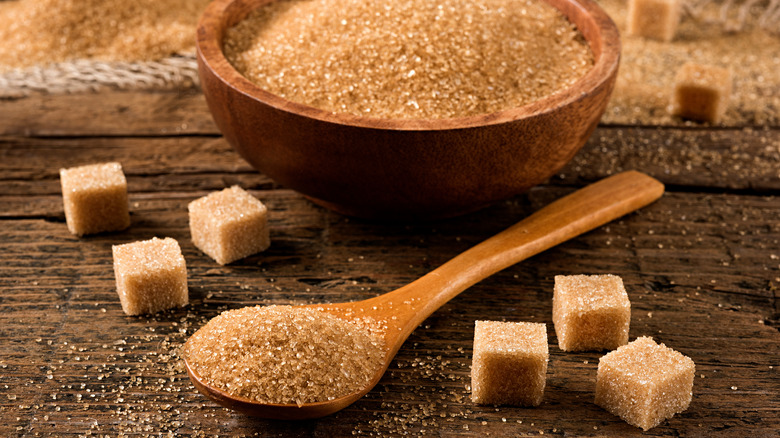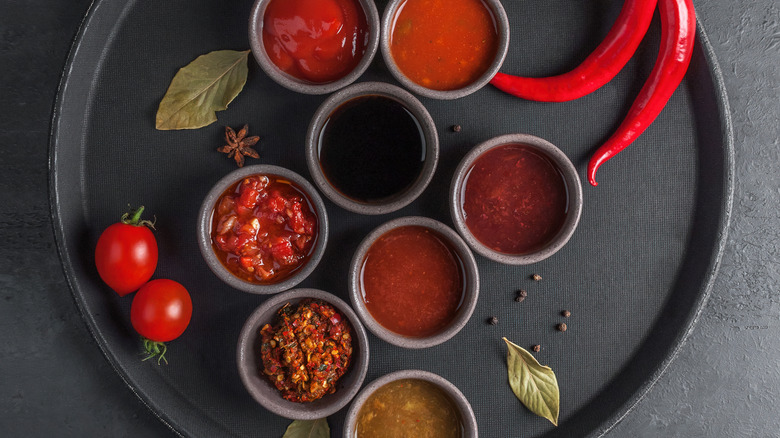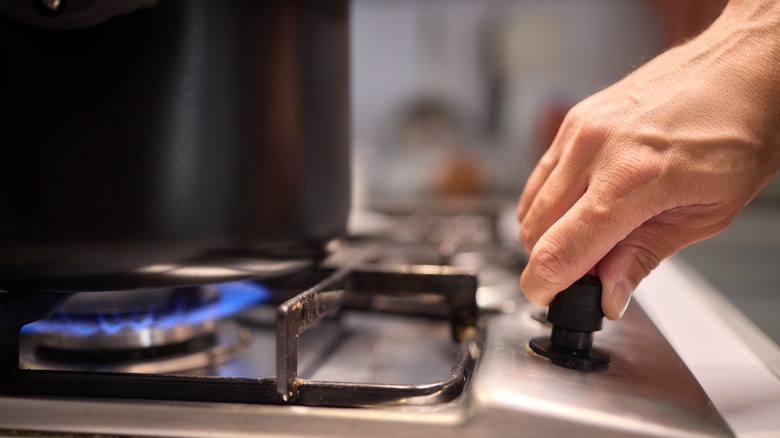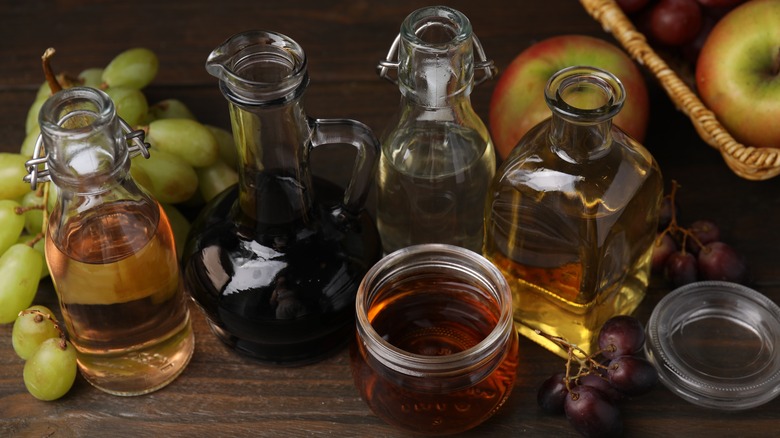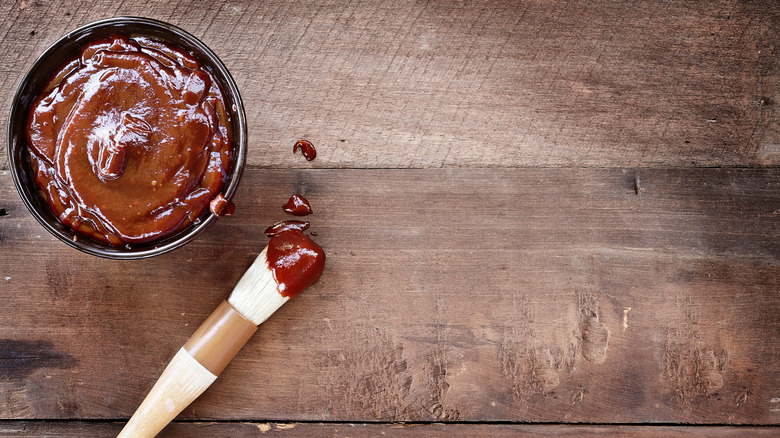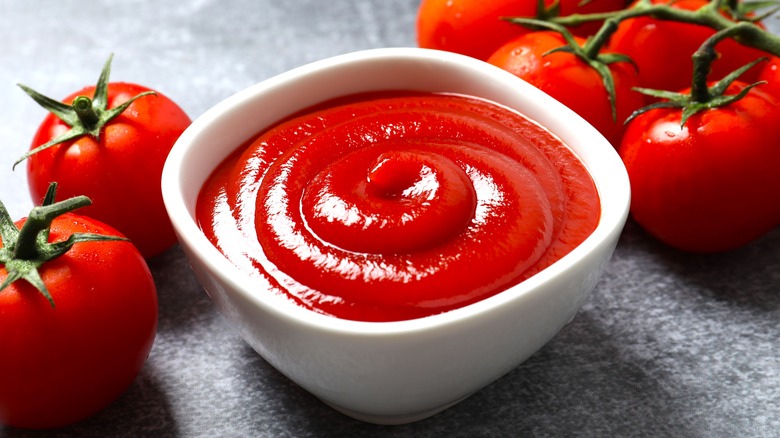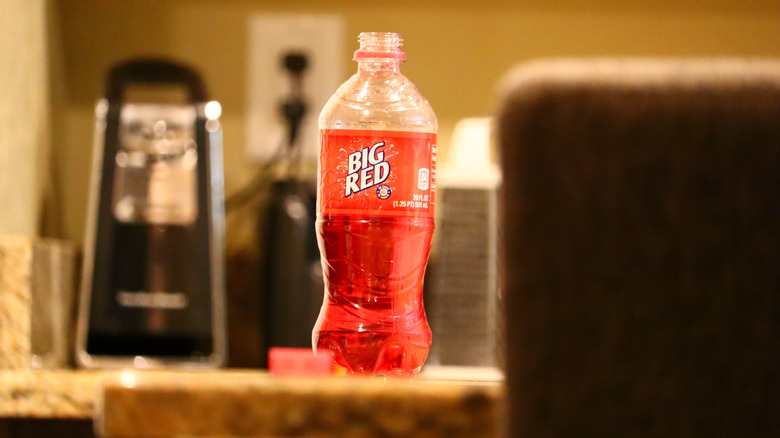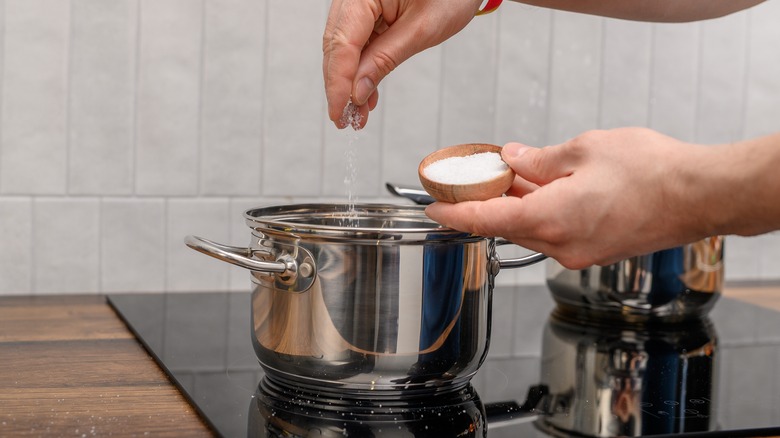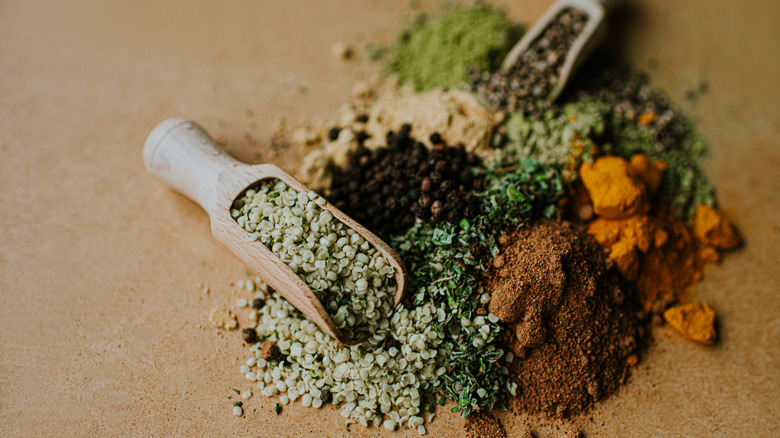You've Been Making Homemade BBQ Sauce Wrong This Entire Time
For most people barbecue sauce comes in a bottle from a grocery store shelf, but some venture into making it themselves. With homemade sauce, the results can be incredible, but there are also so many mistakes you can make. The fact is, you've been making homemade BBQ wrong this whole time. So, if you've been wondering why the sauces you whip up aren't as good as you'd hoped, we might have an explanation for you.
We spoke to experts in BBQ sauce to get their opinions on the common pitfalls and missteps people make when cooking it themselves at home. Even if you're an experienced cook, there are nuances to making these kinds of sauces. You might be able to throw together an alright version, but if you want it to be exceptional, you need advice from the pros.
It's extremely easy to add too much sweetener or not enough, make poorly balanced sauce, or to season it incorrectly. And, if you think there's just one type of BBQ sauce, you're already starting on the back foot. We're going to explore the common errors people make with their homemade sauce and tell you how to fix or avoid them.
Sticking to just one type of BBQ sauce
For many people, BBQ sauce means the reddish brown stuff that you'll find in grocery stores. However, this isn't the only option. It's a mistake to only ever make this kind and ignore all the other varieties.
According to Eudell Watts IV, owner of Old Arthur's Barbecue Sauce, there is a dizzying range of sauces that can accompany barbecue, though one style is more popular than others. "Approximately 70% of all BBQ sauce sold in America is classified as tomato based, but other popularly recognized categories include vinegar based, mustard based, mayonnaise based, and fruit based," Watts says.
We also spoke to Matt Moore, who literally wrote the book on barbecue: "The South's Best Butts." In his book, he discusses the five mother sauces of barbecue. You have sweet BBQ sauce, the classic tomato-based kind; vinegar BBQ sauce, a tangy variety that comes from North Carolina; black BBQ sauce, which is thin and heavy on the Worcestershire sauce; white BBQ sauce, a Northern Alabama sauce with a mayonnaise base; and mustard BBQ sauce, a product of South Carolina and Southern Georgia.
All of these have their own place in the BBQ repertoire. For instance, black BBQ sauce is supposed to go with lamb or mutton, while white BBQ sauce is great with chicken and turkey. But, of course, you don't have to use these sauces for their traditional purposes. Dip fries in them, spread them in sandwiches, mix them in potato salad. The choice is yours.
Only ever using sugar to sweeten BBQ sauce
Most BBQ sauce recipes have some amount of sweetness. You might assume that this means you always have to reach for sugar but sometimes you can go beyond this. There are other sweeteners out there that can be great in BBQ sauce and not exploring them is a mistake. There are many options with alternative sweeteners, such as the homemade honey BBQ sauce.
Brandon Rushing, chef and owner of Briny Swine Smokehouse & Oyster Bar, says that brown sugar is his go-to, but that other options include honey, agave, and maple syrup. Region can play a part as well. White sugar might be the most basic choice for adding sweetness but the origins of a sauce may change what's used. "As you make your way more westward and north in the BBQ belt, items like molasses, honey, and brown sugar start to influence more sauce preparations," says Matt Moore.
In terms of commercial BBQ sauces, cost is a factor. "Many of the larger retail brands often opt for less expensive processed sugar, and high fructose corn syrup to shave down cost," notes Eudell Watts IV. However, he notes that higher-end "craft" sauces often use natural, but more expensive sweeteners such as cane sugar or honey. This tells you that these kinds of natural sweeteners taste better but are avoided by big brands because they're pricey. You can use this information to your advantage and shy away from basic sugar in your recipes, trying out alternative natural sweeteners.
Adding too much or too little sweetener
One thing that many people get wrong when making BBQ sauce is using too much or too little sweetener. Whether you use sugar, honey, molasses, or anything else, the quantity is important. Too much and your sauce will taste sickly sweet. Too little and it won't have the sweetness you expect from BBQ sauce.
Eudell Watts IV tells us that too much sugar can mask the other ingredients in a recipe. "The challenge is in finding balance that allows for a multitude of the recipe's ingredients to shine," he says. However, he notes that part of the fun of making your own BBQ sauce from scratch is experimenting and using trial and error to land on a recipe you love. He recommends going light on the sweetener at first and adding more if necessary. You can always add extra sweetness but you can't take it away, after all.
Brandon Rushing is also an advocate of starting with a little sweetener and using more if you think your sauce needs it. However, he also explains that sweetness can vary according to region. "In some parts of North Carolina, the sauce is rooted in pepper and vinegar; they don't even use sugar," Rushing says. "Texas and Chicago sauces are thicker, and much sweeter," he adds.
Using poor-quality ingredients
When making BBQ sauce from scratch you might end up using whatever ingredients you have in your pantry or can pick up from your local grocery store. However, this isn't always the way to make the best sauce. All three of our experts agree that ingredient quality matters. You get out what you put in, so using cheap, poor-quality ingredients will impact the finished results. "The sauce will only be as good as its ingredients," says Matt Moore.
BBQ sauce has a few key ingredients that work together to create a balance of sweet, tangy, smoky, and savory flavors. If even one ingredient is low quality, it can throw off the whole taste. An example from Brandon Rushing is about the vinegar used in the sauce. "Low quality vinegars are going to give you a different flavor and a lower quality of acidity versus a premium cider vinegar," he says. He recommends using high-quality vinegar.
Using fresh, high-quality tomatoes or tomato paste makes a big difference with tomato-based sauces. Eudell Watts IV remarks that since it's such a big part of some BBQ sauces, it can really make a difference. He advises avoiding using any tomato sauce that contains high-fructose corn syrup or excess sodium. Puréeing your own tomatoes is your best bet.
Overcooking or undercooking the sauce
It is possible to either overcook or undercook BBQ sauce. Both lead to subpar results, just in different ways. These are common mistakes to make, especially when you're new to these kinds of sauces. But learning more about which sauces need to be reduced and the results you're hoping to achieve can help you get it right.
According to Matt Moore, only some sauces benefit from a reduction. Reducing a sauce involves cooking it slowly to concentrate its flavors. If you don't cook it enough, it can end up thin and bland, and the sugars might not meld into the dish. "There is, however, too much of a good thing," says Moore. "Overly cooking down and reducing ingredients will not only concentrate sugars, but cook off the vinegar component of most sauces, resulting in an imbalanced sauce." So, it's important to get it right.
Brandon Rushing also warns against overcooking, noting that it can lead to burned sauce and a scorched pot. "The easiest way to avoid this situation is tried and true in the barbecue world: Cook slow and low," he says.
But not everyone thinks overcooking is much of an issue. Eudell Watts IV says it's unlikely to happen if you even vaguely know what you're doing in the kitchen. He says it's more about cooking the sauce until you have the flavor profile you want and then adjusting the consistency.
Only using whatever vinegar you have in the pantry
Acidity is a crucial part of BBQ sauce. Almost every regional variety uses it in some form. It's part of what gives it that classic sweet yet tangy flavor profile. Many people make the mistake of simply using whatever vinegar they have on hand. Some recipes call for a specific type for a reason. However, there's also room to experiment.
"The style of sauce will dictate the best vinegar but, generally, you're going to find that red wine vinegar, apple cider, and white vinegar are your go-tos," says Brandon Rushing. He says that red wine vinegar is the most common choice for tomato-based and vinegar-based sauces. However, apple cider vinegar is a versatile pick that works pretty much across the board. "It is what we use for all five of the sauces we serve at Briny Swine — it's a workhorse," Rushing says.
Eudell Watts IV suggests branching out and trying different types of vinegar, such as rice wine vinegar or mirin. Matt Moore says that balsamic is an option if you want to mix things up. The vinegar you choose will make a difference to the flavor of the finished sauce, so think carefully about what you pick but don't be afraid to innovate.
Getting the consistency of your sauce wrong
One common mistake people make with homemade BBQ sauce is getting the consistency wrong. It should be thick enough to stick to your food, but not so thick that it clumps. You want a smooth, pourable texture that coats whatever you're grilling or dipping. Too often, though, homemade BBQ sauces turn out either too runny or too thick, and it can throw off the whole dish.
If your sauce is too thin, it won't hold onto the ingredients you're trying to coat with it. Or, if you're using it as a condiment, it'll just run right out of your sandwich or make your fries soggy. When you make sauce that's overly thin, "you can let it bubble gently over medium-high heat to thicken up by letting water escape as steam," explains Eudell Watts IV.
On the other hand, if your sauce is too thick, it can be hard to spread or dip things into. "You can also loosen the sauce up a bit by adding water, tomato juice, beer, or any other liquid you might experiment with," adds Watts. Using liquids other than water to thin the sauce is a good way to add extra flavor. But, if you're already happy with the flavor, it might be best to stick to water.
Using full-sugar ketchup as a base for BBQ sauce
Some people make tomato-based BBQ sauces with ketchup as the base to save time and effort. However, it's a mistake to use full-sugar ketchup for this. You might make your finished sauce overly sweet or one-note. Choosing the right ketchup gives you more freedom to create a BBQ sauce that tastes just right.
If you decide to use ketchup as a base for homemade BBQ sauce, try to choose a low-sugar or no-sugar option. Regular ketchup already contains a lot of sugar, and using it can make your BBQ sauce too sweet. Starting with a low-sugar or no-sugar ketchup means you'll have more control over the sweetness. You also have more say in the flavor profile. You can add honey, molasses, or brown sugar rather than sticking to the white sugar or corn syrup often found in ketchup.
However, avoid ketchups that replace sugar with stevia or artificial sweeteners. These sweeteners can give your BBQ sauce an unnatural aftertaste, which doesn't go well with the other ingredients. Artificial sweeteners also don't caramelize the same way that natural sugars do, which can affect the sauce's texture and flavor when you grill or cook with it.
Not considering adding soda to your BBQ sauce
When making BBQ sauce, it's a mistake not to consider using soda as an ingredient. We're not saying you have to make this kind of sauce but at least float the idea. Soda-based BBQ sauces are way tastier than they sound. You don't really taste the soda, you just get some of its notes, which can add an interesting depth of flavor.
One soda that Texans love to use in BBQ sauce is Big Red. This bright red soda is unlike anything else, with notes of fruit and vanilla. While there are various ways to make Big Red BBQ sauce, some versions involve simmering it with tomato chutney, ketchup, brown sugar, Worcestershire sauce, and more.
Other sodas, like cola or root beer, can also work well if you can't find Big Red. Each one brings its own character, giving you the opportunity to experiment. You might want to give it a trial run before you unleash it on unwitting guests at your next cookout, but you can get some tasty results.
Failing to balance flavors in BBQ sauce
BBQ sauce is all about balance. And sometimes manufacturers even get it wrong. That's why people sometimes balance overly sweet store-bought BBQ sauce with vinegar. But when you're in charge of the recipe, you make the rules and it's a mistake not to get that balance right.
According to Matt Moore, good BBQ sauce needs a balance of "salt, acid, heat, and sweet." But how you do that is either by following a good recipe or using a degree of trial and error. You can start with a rough recipe and develop it until you get the perfect balance for your preferences.
"It does help to know what each of your ingredient items tastes like by themselves," says Eudell Watts IV. "Take a moment to sample a small bit of each, to try and anticipate how any of them might show up in the recipe." Plus, there's preference to contend with. For instance, Brandon Rushing likes to have a strong balance of sweet and acidic notes, while others might prefer more subtly.
Losing track of any tweaks when developing your own BBQ sauce recipe
If you're trying to develop your own recipe for BBQ sauce, one of the biggest mistakes you can make is to not keep track of the ingredients used or any changes you make as you tweak the recipe over time. Imagine you get into the flow of cooking, throwing in a pinch of this and a splash of that. You end up making the most delicious BBQ sauce. But you have no idea how you made it because you weren't noting it down.
"If you alter an ingredient or an amount, it has a material difference on the end flavor," notes Eudell Watts IV. And, if you don't write it down, you're probably going to forget it. "This means you risk losing any progress in refining your flavor profile," says Watts. However, if you're consistent in keeping track of tweaks and changes, down to the last grain of salt, your recipe will keep getting better each time you make it.
Leaving alcohol out of your BBQ sauce
Leaving alcohol out of your homemade BBQ sauce is a common mistake. Not every recipe has to have it but it's worth experimenting with. Certain types of booze can bring a depth and intensity of flavor to your sauce, blending well with the sweetness and tanginess of the other ingredients. Most of the alcohol burns off when you cook the sauce, only leaving the flavor behind, so you won't end up with a boozy sauce, just one that tastes even more delicious.
Whiskey and bourbon bring sweet and smoky notes. They pair especially well with ingredients like brown sugar, molasses, and tomatoes in a classic red sauce. However, a more surprising option is to add tequila to BBQ sauce. It gives the sauce a fruity sweetness that you want to detect without it being overwhelming.
Beer is another excellent option. Dark beers, like stouts or porters, add a malty flavor that's perfect for a hearty BBQ sauce. If you prefer a lighter sauce, try adding a pale ale or blond beer. Start with a small amount, then adjust based on your taste. Add the alcohol early in the cooking process so it can cook down before adding the other liquid ingredients. Then let everything simmer together for a while so the flavors can meld.
Not trying out different spices and seasonings
While classic recipes can be the way to go, it's also a mistake not to try out a range of spices and seasonings in your homemade BBQ sauce. This can take your finished sauce to the next level, so it's not just the same as any old recipe.
Even the traditional tomato-based recipes, similar to the kind that you find in every grocery store, use spices you might not expect, such as allspice and coriander. These kinds of spices with a sweet note can bring a lot to BBQ sauce. Other options include cinnamon, cloves, and nutmeg.
But you can also branch out into more traditionally savory herbs and spices. Eudell Watts IV recommends smoked paprika, while Matt Moore uses onion powder, garlic powder, cayenne pepper, and celery salt in some of the sauce recipes in his book. Other possible additions include thyme, oregano, and sage, even if they aren't necessarily authentic. You can play around with seasonings and spices until you find a formula you love.
